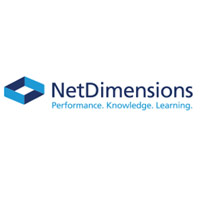In our latest webinar, ‘Getting started with an integrated learning ecosystem’, we were joined by gomo Managing Director, Mike Alcock, to discuss the challenges and benefits of a learning ecosystem in an increasingly connected world.
Mike Alcock and NetDimensions Senior Vice President, Bill Mastin, and Director of Professional Services, Ashraaf Alexander demonstrated how gomo and NetDimensions can help overcome an array of learning challenges.
We took questions from the webinar attendees and concluded the session with an informative Q&A session. We have included a selection of the answers below, and you can access the full recording of the session here.
1. Are branching, javascript and question formats supported in gomo and NetDimensions?
Mike: Branching is absolutely supported in gomo, from the simple use of a button through to something called display conditions and variables. So you can do branching based on logic, for example: if the learner is only running at a 30% score at this point then take them down this path, or if their score is over 70% take them down that path. This gives you almost unlimited flexibility on branching non-linear courses.
Regarding question formats, we have almost every format you would expect to see in a modern authoring tool. Drag and drop is the latest question format we’ve added, but we also support multiple choice, select from list and hotspot images. Question banks are also present, so if your learners are on computers side by side they can’t look at each other’s answers because the questions are randomized. We don’t allow JavaScript in gomo.
Ashraaf: In terms of the question types, it varies from hotspots, single, multiple choice, randomization, security around questions, so there certainly are quite a few options available in terms of the question bank and the exam engine available in NetDimensions.
2. Does NetDimensions integrate with collaborative institutional training initiative (CITI) modules for research training?
Bill: If those are standards-based modules that have interoperability standards such as SCORM, SCORM 2004 or xAPI then we would absolutely be able to integrate with them.

